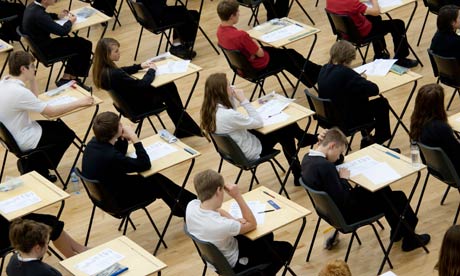The Guardian
Organisation for Economic Co-operation and Development also says countries prioritising teaching over class sizes fare better
Jeevan Vasagar and Jessica ShepherdArticle history

The OECD study showed that 74% of 15- to 19-year-olds in the UK were in education in 2009, below the average of 82%. UK Photograph: Keith Morris/Alamy
Britain does worse at keeping young people in education than most other developed countries, according to analysis by the Organisation for Economic Co-operation and Development.
In the UK, 74% of 15- to 19-year-olds were in education in 2009, compared with an average of 82% across the 42 countries studied. Only Chile, Israel, Mexico and Turkey fared worse.
This is despite the UK's spending on education rising at a faster rate than in many other countries. Between 2000 and 2008, funding for primary and secondary education increased by 56% in the UK – the eighth highest increase of 30 nations. Spending on higher education grew by 30%, the sixth highest increase.
Overall, spending on education in the UK was two percentage points below the OECD average of 5.9% of GDP. However, expenditure has shifted from public to private sources.
The analysis, published in the OECD's annual Education at a Glance report, shows adults without "baseline qualifications" – the equivalent of five good GCSEs – have borne the brunt of the economic crisis. The employment rate for these adults dropped from 65.6% to 56.9% – a fall four times greater than the average.
At the same time, adults in the UK with degrees have an above-average earnings premium. Having a degree in the UK gives the average male adult an estimated extra $208,000 (£132,000) over his lifetime, the report found.
The analysis shows that moving from school or training to the labour market in the UK is particularly difficult. Some 17% of 20- to 29-year-olds were in education in 2009, below the average of 26%. Only Turkey and Mexico did worse. And 4.9% of those without A-levels or qualifications above GCSE level were out of education and employment. The OECD's average was 2.7%.
Andreas Schleicher, head of the OECD's educational statistics and analysis division, said the transition between education and work was "smoother" in countries with work-study programmes in secondaryschools. He said the UK had only a small proportion of students on these programmes, compared with Australia, Germany, Austria and other countries.
Class sizes at secondary school have fallen at a faster rate than other countries, the report shows. In the early years of secondary school, there tends to be 20 students per class in the UK, compared with 24 on average. However, at primary school, there are 24.5 pupils per class in the UK, compared with the average of just over 21.
Countries that perform better than the UK in international tests "are generally prioritising the quality of teachers over the size of classes", Schleicher said.
The University and College Union (UCU), which represents college lecturers, warned that unless the government reversed cuts to further and higher education, the UK risked dropping further behind competitor countries. Sally Hunt, UCU's general secretary, said the UK was "languishing in the relegation zone when it comes to public spending on higher education".
She said: "The UK's poor record of investment in educating adults places us at a real disadvantage against other countries. We need an urgent debate about the importance of education and skills to our economy and society before it is too late.
"As the OECD points out, public investment in education repays itself many times over, but government policy means our workforce is poorly prepared for life in the new knowledge economy."
Wendy Piatt, the director general of the Russell Group – a group of 20 leading universities including Oxford and Cambridge – described opportunities for 15- to 19-year- olds in the UK as "very disappointing".
"We are wholeheartedly committed to broadening access so that every student with the qualifications, potential and determination to succeed at a Russell Group university has the opportunity do so, whatever their background," she said. "But one of the key challenges we face is that too few young people from disadvantaged backgrounds continue in education beyond the age of 16."
The report analysed the 34 countries of the OECD, plus Brazil, the Russian Federation and Argentina, China, India, Indonesia, Saudi Arabia and South Africa.

Nenhum comentário:
Postar um comentário